 |
Index
|
Index

Figure 1. The soul - the 'heart' of a person.
Then the LORD saw that the wickedness of mankind was great on the earth,
and that every intent of the thoughts of their hearts was only evil continually.
Genesis 6:5 NASB
The epigraph confirms the default state of mankind's soul (aka, 'heart').
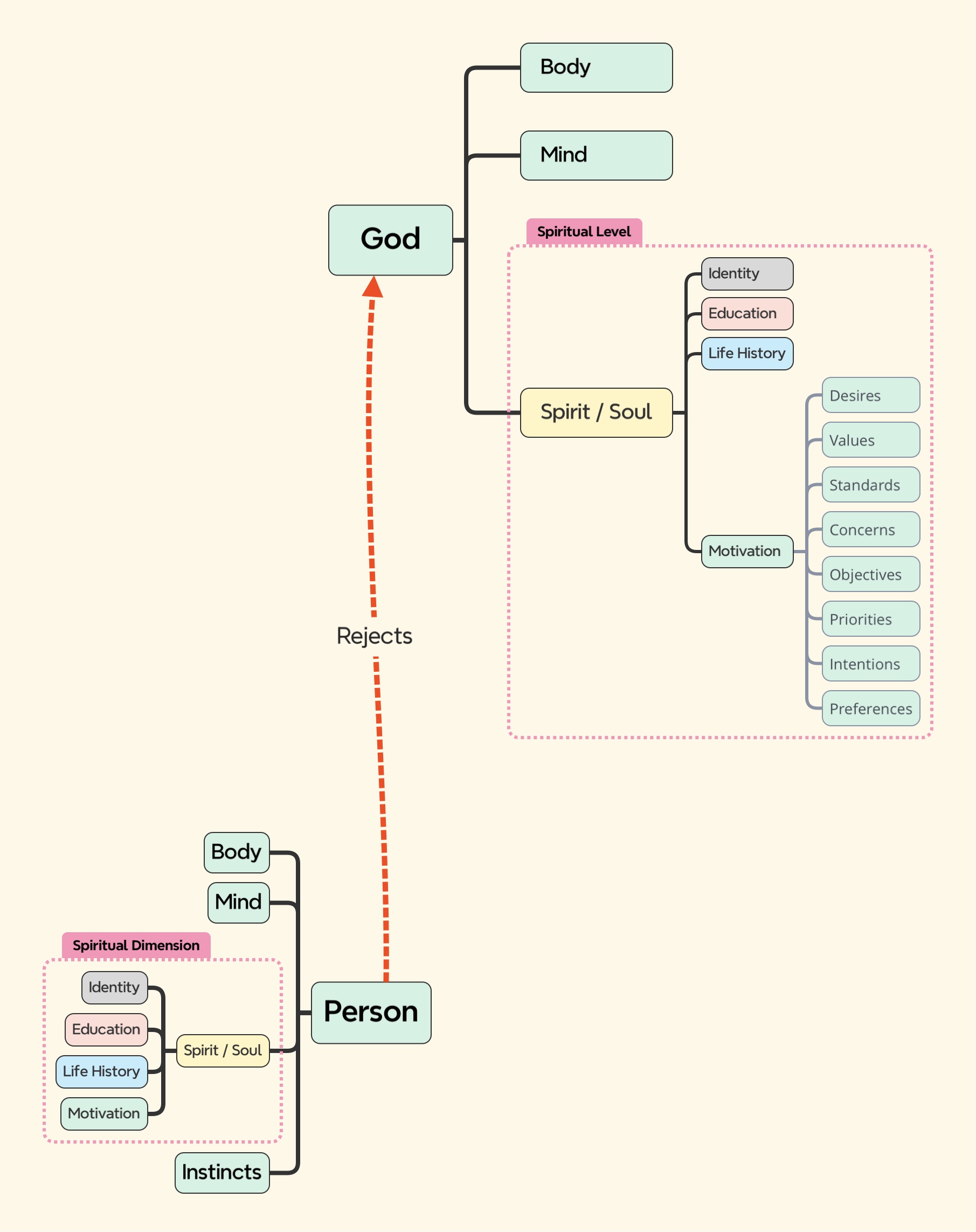
God rejected.
Since the person has rejected God, there is no contract in place, and the person is free to do what they want. Without a contract, the Lord God has neither commitment nor obligation to the person who has rejected Him. This may seem hardline to many, simply because the growing tendency of the church is to treat the Lord God as some sort of 'Father Christmas' figure. Yet a simple search of the Scriptures will confirm that those sinners whose names are not in the Book of Life will ruthlessly be dealt with. In this passage from Scripture, we see Jesus' coldness and anger as He consigns to Hell those who'd thought themselves to be saved:
[21] “Not everyone who says to me, 'Lord, Lord,' will enter the kingdom of heaven, but only the one who does the will of my Father who is in heaven. [22] Many will say to me on that day, 'Lord, Lord, did we not prophesy in your name and in your name drive out demons and in your name perform many miracles?' [23] Then I will tell them plainly, 'I never knew you. Away from me, you evildoers!'" (Matthew 7:21-23 NIV)
Although the person who rejects God is free to go their own way, should they upset the Lord sufficiently, then He may well call time on their evil. The Day of Judgement will eventually come around, and those sinners whose names are not in the Book of Life will find themselves consigned to Hell.
The Lord is mindful of their situation and ultimate fate; so, to those sinners whose names are not in the Blacklist, He says,
"Do you think I enjoy seeing evil people die?" asks the Sovereign LORD.
"No, I would rather see them repent and live." (Ezekiel 18:23 GNT)
And how they are to repent is to be found, not in the House of Desolation's covenant with Death, nor in Paul's false doctrine, but in the compound, complex Covenant contract, as explained in the Book of Teaching†.
[† That is to say, the Scriptures, as currently defined.]
[Essay: The dynamic of the Covenant.]
It is often said that a person comprises a body, mind, and spirit (aka 'soul'), though a person's animal instincts can never be ignored. But what does that mean? The question becomes more difficult with references to the person at the physical or spiritual levels.
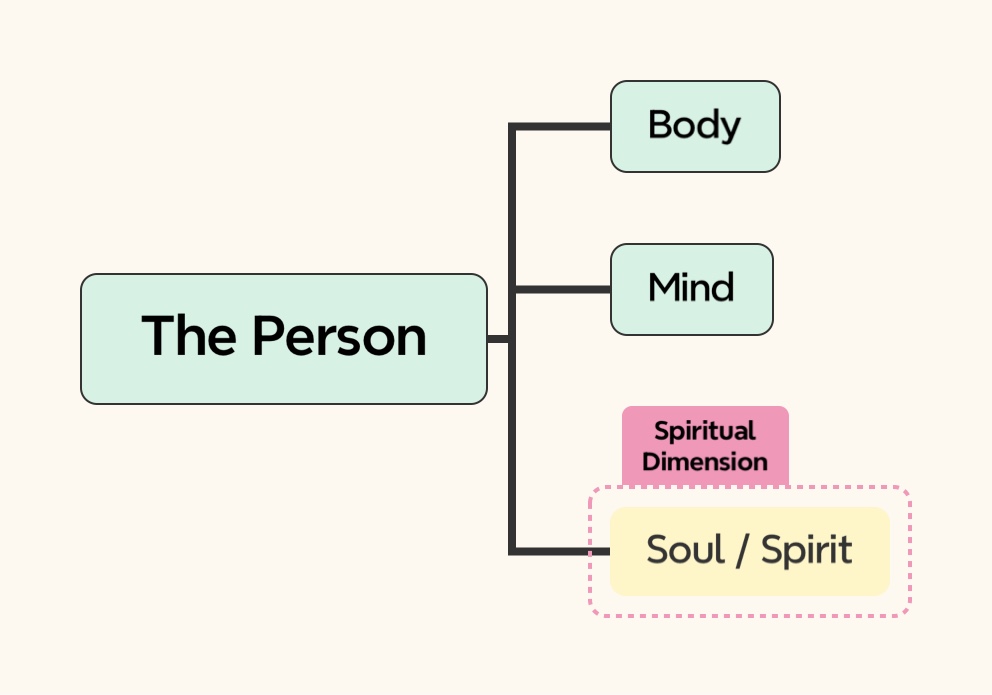
The person.
The person may be likened to a laptop - though one wouldn't want to push that analogy too far!
The body would then resemble the hardware, the casing, the hard-drive, the microphone, the speakers, keyboard, and so on...
The mind - or brain, if you prefer - could be thought of as the operating system, the software which would enable the body to function as a person. Input from the soul would then determine the personality and behaviour of the individual.
Memory would then be the soul, the data-set held on the hard-drive, the brain. Here would be found the person's identity, knowledge, values, life history, motivation, and so on...
The details of the soul exist as physical entities located in memory within the brain.
It is a well-attested fact in Scripture that the physical soul will continue on after death. But how can that happen?
The answer may be found in cloning. The soul at the Physical Level is cloned at the Spiritual Level in the Heavenly Realm, being updated in real-time. Following death, the mortal body is replaced by an immortal body free of blemish, in which is embedded the cloned copy of the soul.
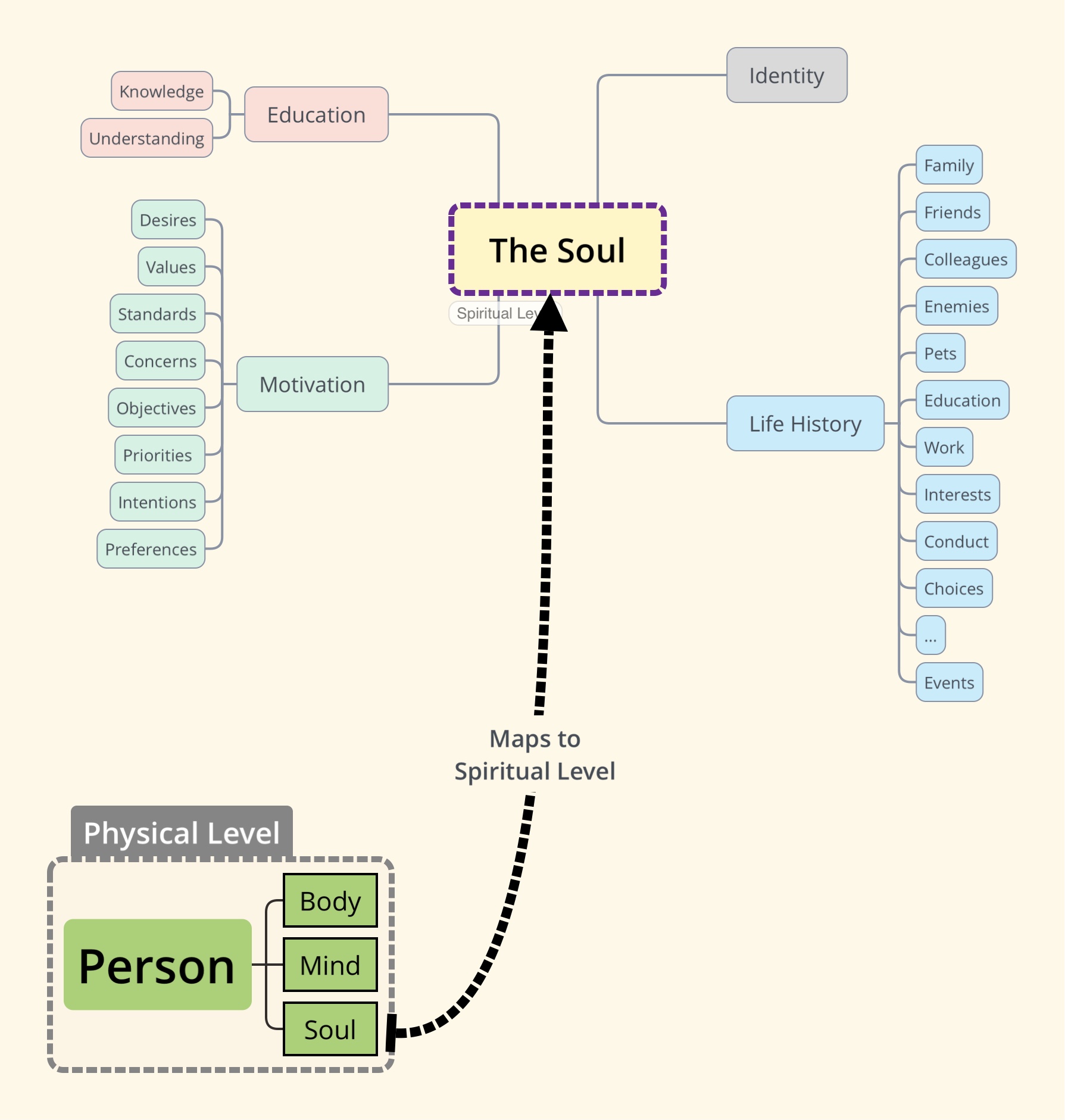
The Soul.
The narrative of the rich man and Lazarus provides evidence for what takes place when a person dies.
Note: The Spiritual Level refers to the abstract, conceptual level. But I also use it to refer to the Heavenly Realm. Thus a person's soul exists at the conceptual and physical levels in the known universe; however, a copy of the soul also exists at the conceptual and physical levels in the Heavenly Realm.
[Essay: The declaration that the Heavenly Realm exists at the 'Spiritual Level', implies that the Heavenly Realm is a place of absolute truth and integrity - itself the instantiation of a still higher level of spiritual abstraction, namely the Prime Axioms.]
Concepts and intentions, when instantiated, may have consequences which could be for good or evil. The question here is, "Who defines what is good and what is evil?"
And it is here that the Prime Axioms come to our rescue, for they explain who God is, His values, and His intentions. They show that God's intentions are predicated on goodness and justice. God's character emerges as we study the Prime Axioms.
Mankind's values and intentions default to evil (Gen. 6:5) - though they are free to change that if they so choose.
Here is a generalised schematic of God's soul:
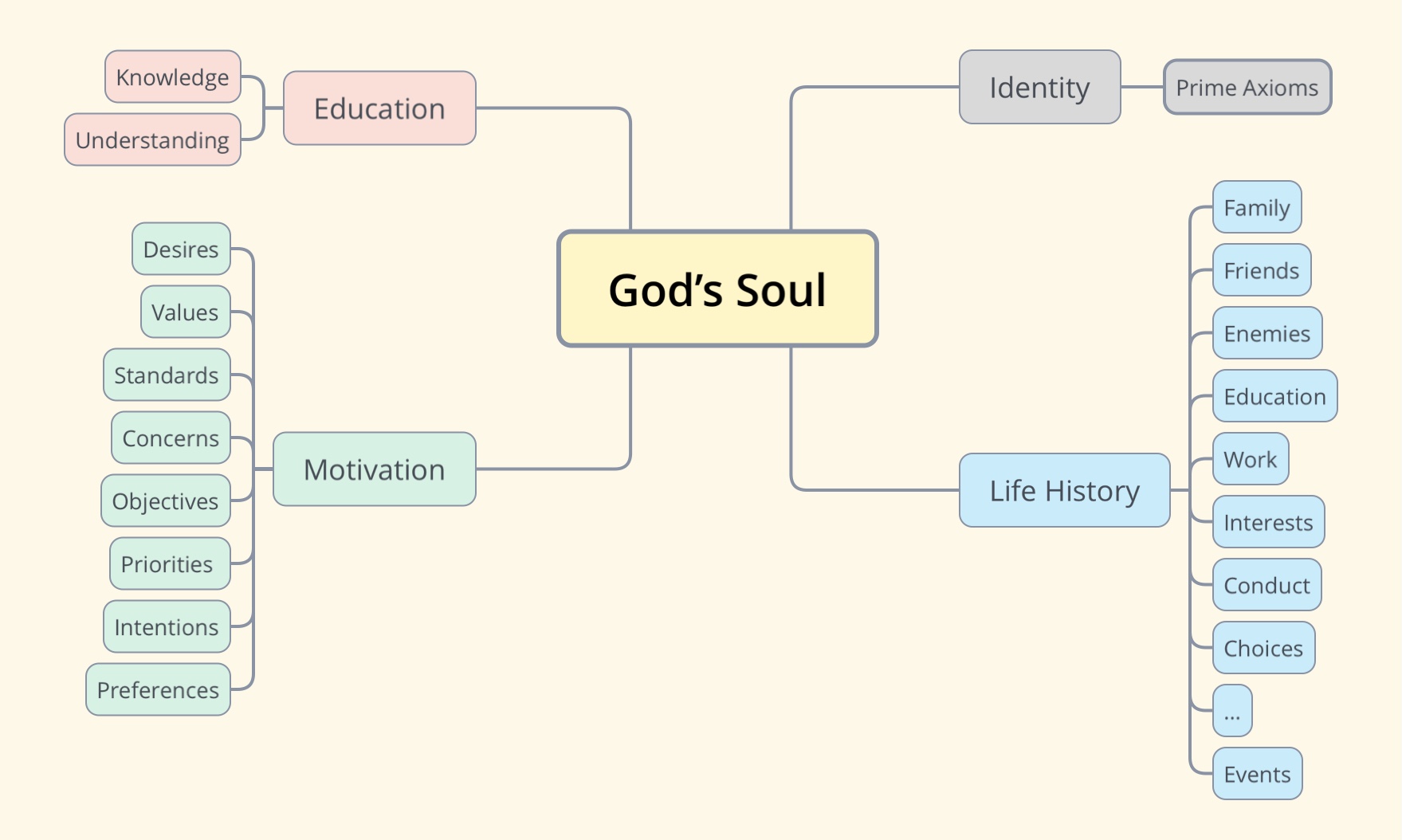
God's soul - a schematic.
The Prime Axioms define God, who He is and His commitment to doing what is right and beneficial. The Law† determines what is acceptable in God's sight.
[† The Law is no longer defined by a list of 613 commandments, since it results from the evaluation of the Two Abstract Rules.]
We may not be aware of the details of God's education. Neverthelesss, it would be a safe assumption to say that it was of the highest standard!
With regard to God's motivation, the Prime Axioms confirm that it is dedicated to doing that which is right.
As to the success of God's dedication to doing what is true, fair, and helpful, that may be judged by examining His life history, and what He has done in the world. Which is the reason why history forms such an important part of Israel's education (eg: Deuteronomy chapter 11; Isaiah 59:21). Such knowledge reinforces people's faith, trust, and understanding of God.
[Dissertation: The support of the past, present, and future.]
Much can be learnt from the narrative of Lazarus and the rich man:

The Soul.
[19] "There was a rich man who was dressed in purple and fine linen and who feasted sumptuously every day. [20] And at his gate lay a poor man named Lazarus, covered with sores, [21] who longed to satisfy his hunger with what fell from the rich man's table; even the dogs would come and lick his sores. [22] The poor man died and was carried away by the angels to be with Abraham. The rich man also died and was buried.
[23] In Hades, where he was being tormented, he looked up and saw Abraham far away with Lazarus by his side. [24] He called out, 'Father Abraham, have mercy on me, and send Lazarus to dip the tip of his finger in water and cool my tongue; for I am in agony in these flames.'
[25] But Abraham said, 'Child, remember that during your lifetime you received your good things, and Lazarus in like manner evil things; but now he is comforted here, and you are in agony. [26] Besides all this, between you and us a great chasm has been fixed, so that those who might want to pass from here to you cannot do so, and no one can cross from there to us.'
[27] He said, 'Then, father, I beg you to send him to my father's house- [28] for I have five brothers-that he may warn them, so that they will not also come into this place of torment.'
[29] Abraham replied, 'They have Moses and the prophets; they should listen to them.'
[30] He said, 'No, father Abraham; but if someone goes to them from the dead, they will repent.' [31] He said to him, 'If they do not listen to Moses and the prophets, neither will they be convinced even if someone rises from the dead.'" (Luke 16:19-31 NRSV)
The narrative provides a lot of information on the soul and its transcendence (see also Lazarus).
There is no memory wipe! The rich man, consigned to Hell, is aware of his own identity and the identities of those in his father's household (Lu. 16:28).
Not much to note here. However, the rich man is certain that if someone from the dead goes to his family, then they will repent (Lu. 16:30).
Abraham corrects the rich man (Lu. 16:31) - not that it will make any difference to his sojourn in Hell. Their conversation is recorded in order to educate those who will one day read or listen to the narrative.
The background history (Lu. 16:19-22) sets the scene.
The rich man was uncaring of the plight of Lazarus, despite Covenant teaching that one's neighbour was to be cared for (second abstract rule). And this uncaring attitude continues across the portal of death. His concern is for himself (Lu. 16:24).
There is a tendency today for a victim to 'forgive' the evildoer despite a complete lack of true repentance. Such false forgiveness is not without its own problems (Dr Paul Tournier). The chasm between Heaven and Hell confirms that false forgiveness only achieves less than nothing; and makes one complicit in the wrongdoing.
The rich man's motivation may be summarised as 'self-serving'. His concern is restricted to himself and his family, not the wider needs of those on Earth.
But isn't this typical of the church today? They peddle Paul's false doctrine, imagining they are doing God's work. They imagine that their efforts are accruing brownie points in the eyes of the Lord God. Yet they defiantly refuse to see the errors of their doctrine and its ineffectiveness in the world. Neither do they see the contribution which their lies are making to the world's active descent into hell.
They claim the high moral ground, yet fail to realise that they are not meeting the needs of the people. Neither do they address the needs of their neighbour, those who will live through the terrors of the Last Days.
The church, with its false doctrine, is negligent. They neither minister to today's broken world; nor do they ensure the solid foundations of the Messianically Amended Covenant which will support the faithful living in the Last Days.

Notice that so far the discussion has centred on those whose minds are fully functional at the point of death.
[Dissertation: Mental impairment and transcendence of the soul.]
[See also Trinity.]
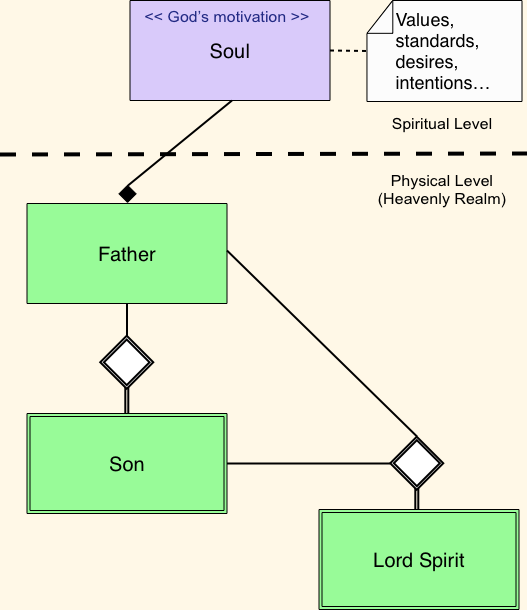
Trinity dependencies
Both the Son and the Lord Spirit have discarded their own motivation; instead, they have chosen to align their motivation with that of the Father. Jesus and the Lord Spirit have handed over the direction of their lives to the Father, and have become entirely dependent on Him. Jesus and the Lord Spirit are now dependent on obedience to the Father's directions. Notice, too, how the schematic reveals the Lord Spirit's dependence on Jesus, the Son.
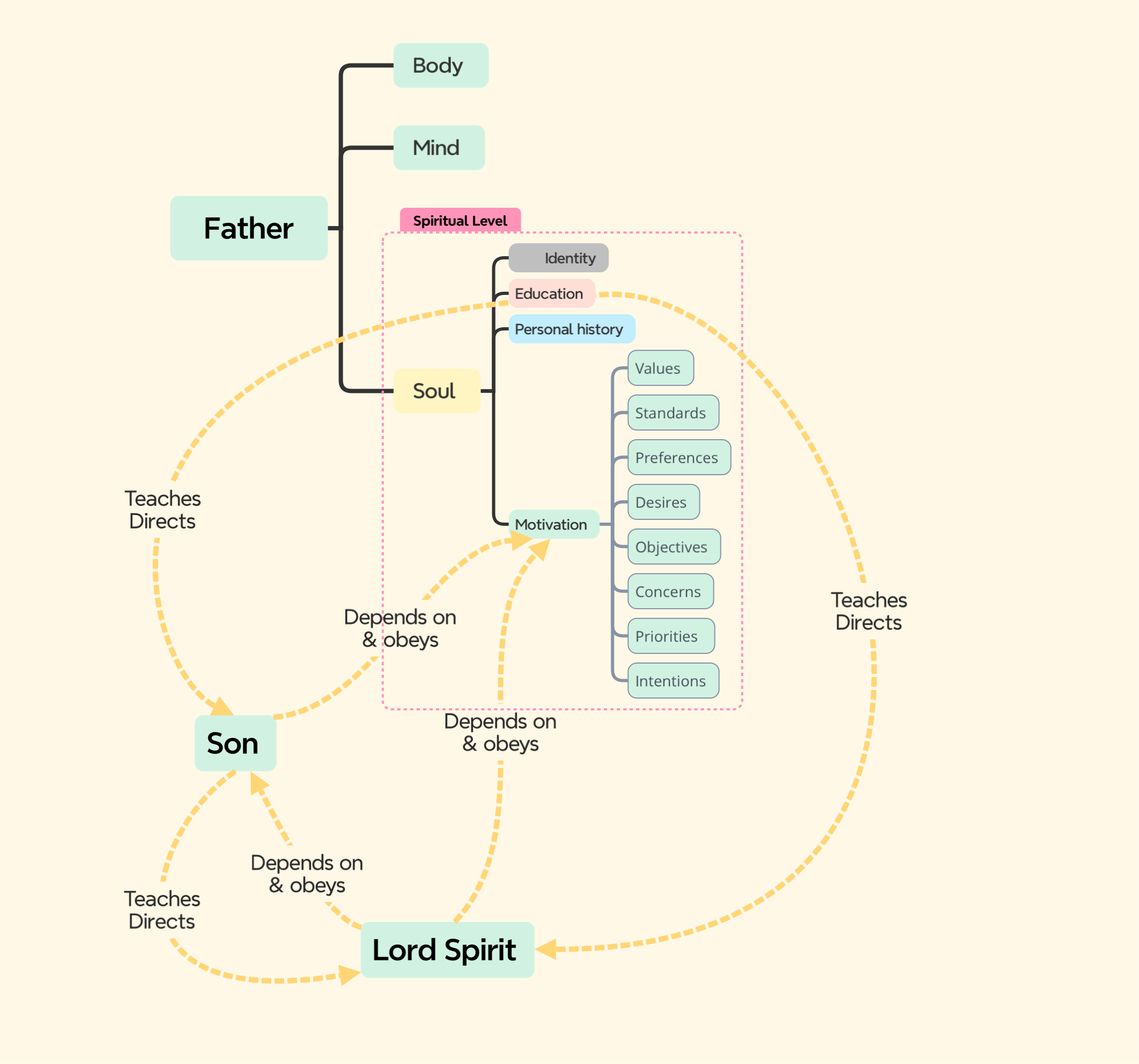
Son and Spirit hand over the direction of their lives.
Handing over the direction of their lives to the Father, entails the obedience of the Son and the Lord Spirit.
Not, let it be noted, in Paul's so-called 'new way', which excludes God's Covenant:
[6] But now, by dying to what once bound us, we have been released from the law so that we serve in the new way of the Spirit, and not in the old way of the written code. (Romans 7:6 NIV)
But rather in obedience to the terms and conditions of the Trinity Covenant contract (cf, Primary Contract).
This paradigm shows concisely how the unity desired by Jesus† may be achieved.
[†
[20] “My prayer is not for them alone. I pray also for those who will believe in me through their message, [21] that all of them may be one, Father, just as you are in me and I am in you.
May they also be in us so that the world may believe that you have sent me. [22] I have given them the glory that you gave me, that they may be one as we are one--- [23] I in them and you in me---so that they may be brought to complete unity. Then the world will know that you sent me and have loved them even as you have loved me. (John 17:20-23 NIV)
]
In John 17:20-23, notice how Jesus extends the Trinity Paradigm to include those who are committed to the Covenant (currently the Messianically Amended version of the Mosaic Covenant).
Of the members of the flock, some will be single, some living together, some will be married under civil law, and yet others, perhaps, will be married under Covenant Law.
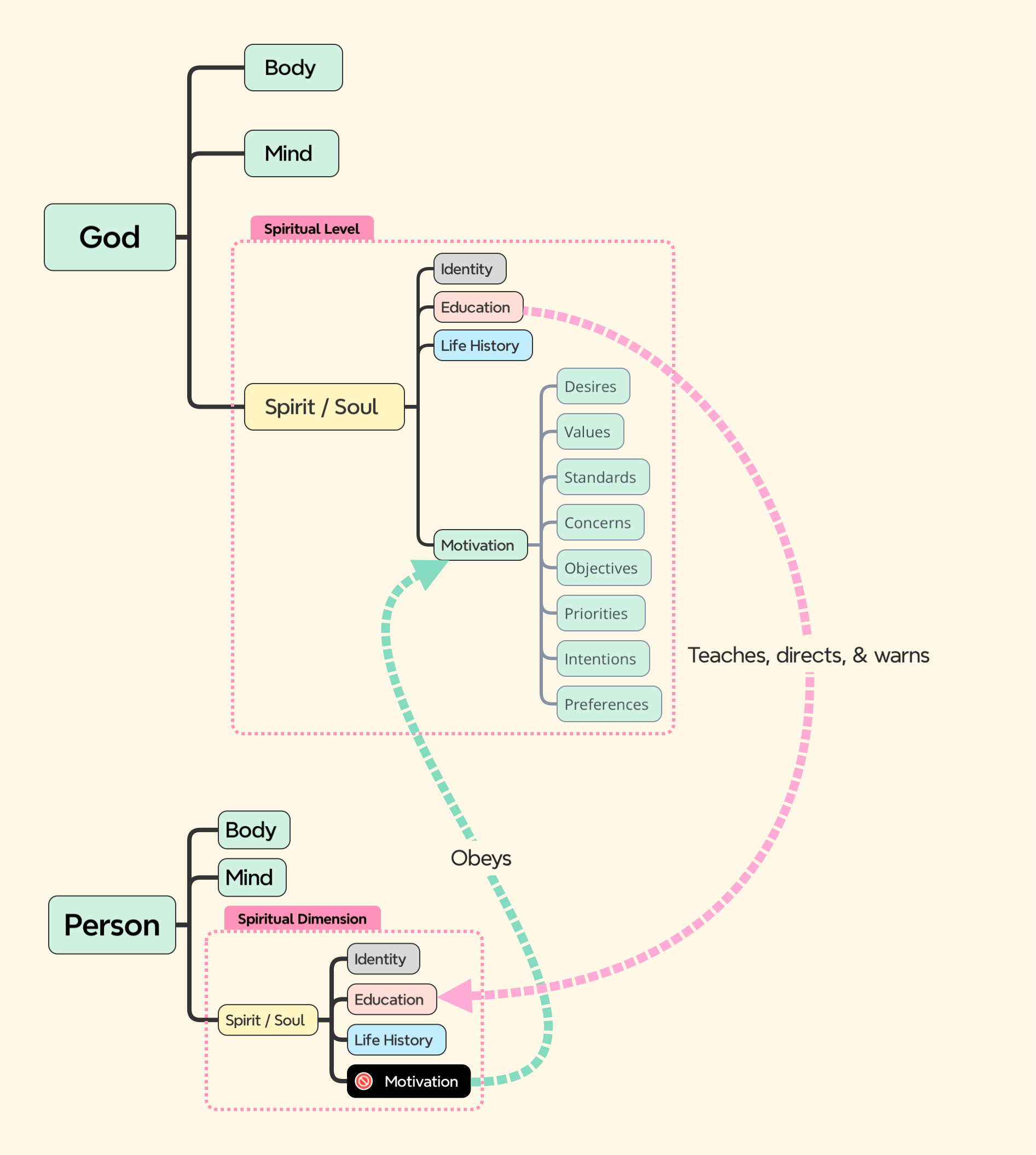
The Individual.
Under the Covenant, the individual seeks to learn from God, hands direction of self over to God, and obeys Him, despite personal hardship or loss. In this way, the individual finds fulfilment, purpose, and a productive life pleasing to the Lord. Although this may seem straightforward, in practise it is far from easy! Just be aware!
[Assignment: Produce a schematic, in the format of your choice, showing the relationships between the individual and each member of the Trinity.]
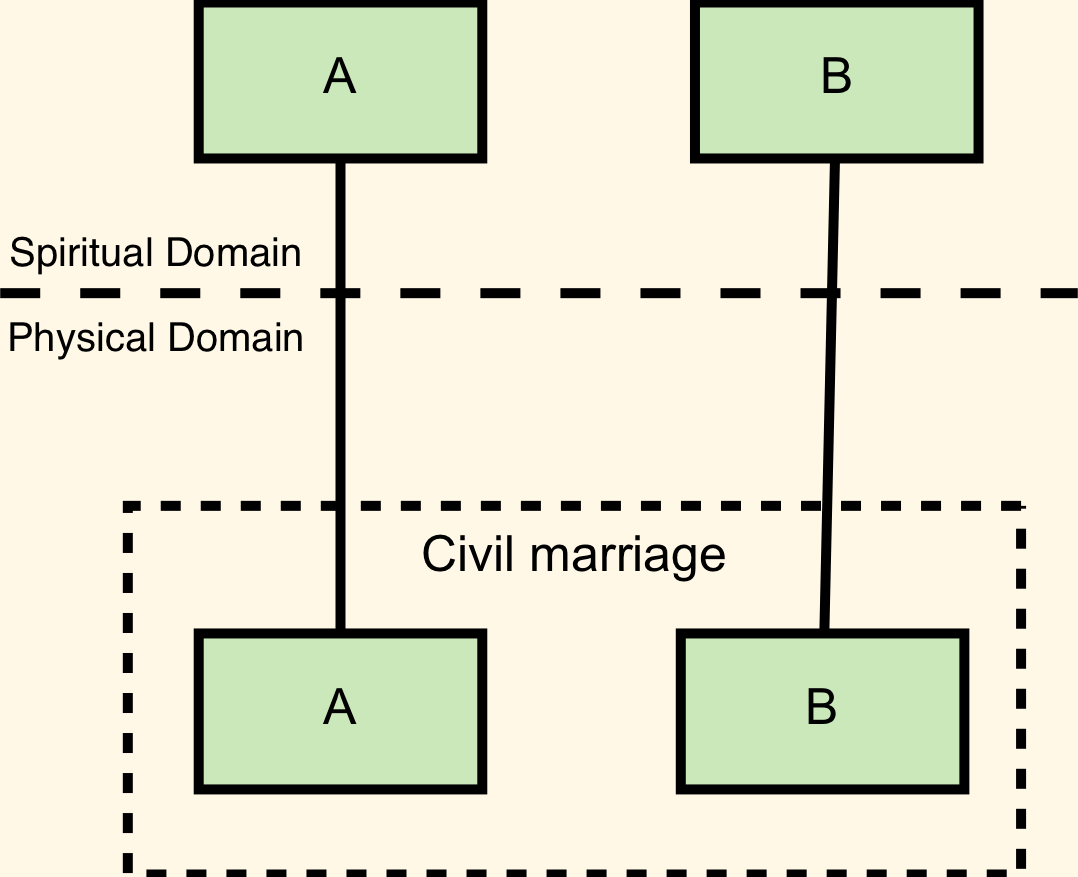
Civil marriage.
Civil marriage is really a partnership, with or without an enforceable contract. 'A' or 'B' can be man, woman, or pet - or anything in between.
The state of such a marriage is undetermined, even among those who are religious:
[34] I tell you, on that night two people will be in one bed; one will be taken and the other left. (Luke 17:34 NIV)
For those who've been in a meaningful relationship, there will undouptedly be a measure of sadness, perhaps regret...
[Dissertation: Civil marriage, disparity, and the disparity which results from the timing of conversion to the Covenant.]
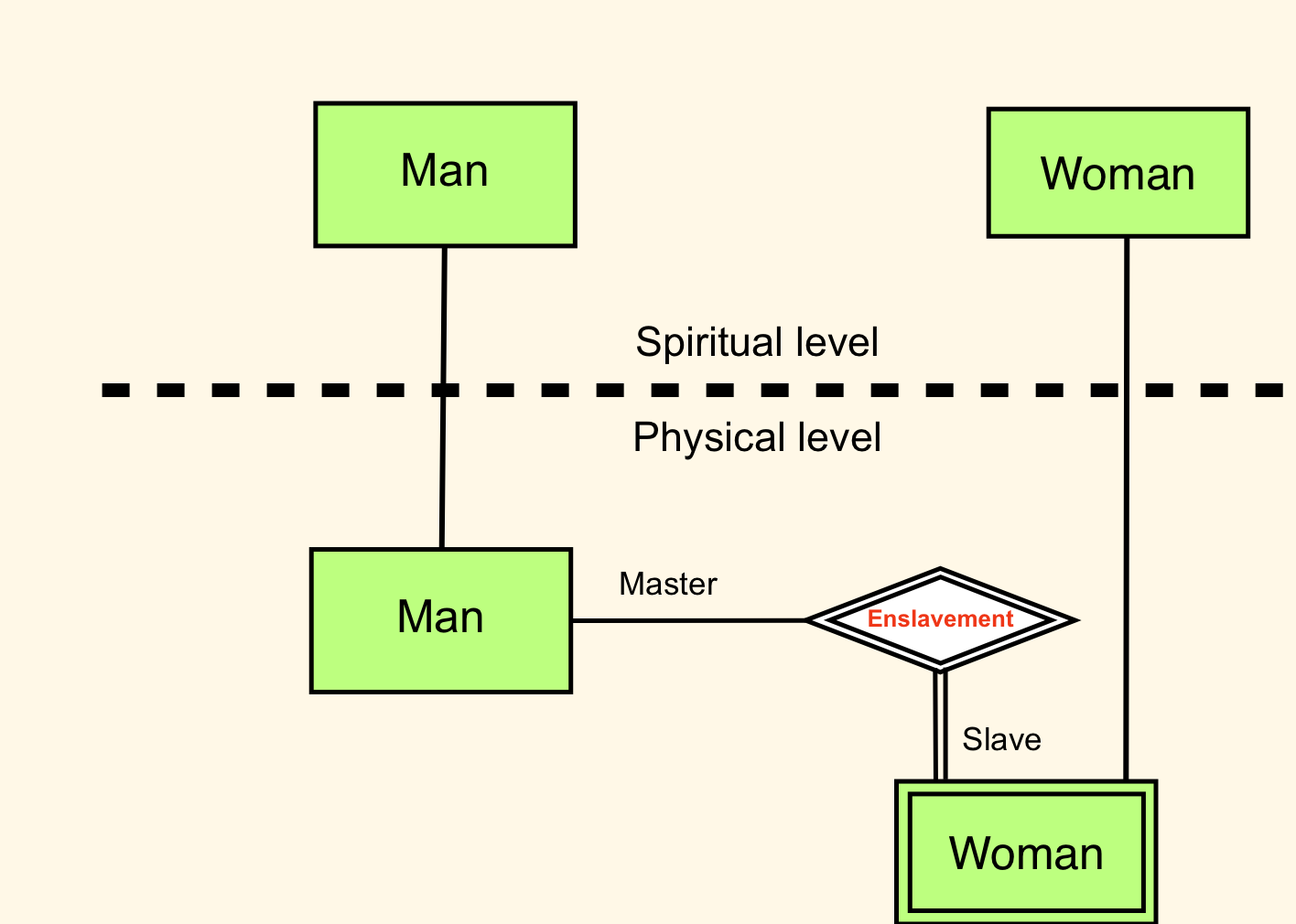
Pauline 'marriage'.
Pauline 'marriage' isn't marriage at all. It is enslavement, pure and simple. And this state of enslavement encompasses all women:
[11] Let a woman learn in silence with full submission. [12] I permit no woman to teach or to have authority over a man; she is to keep silent. (1 Timothy 2:11-12 NRSV)
It is clear, from Paul's words, that he subjects women to duress. Peter, clearly taking his lead from Paul, doesn't go that far; instead, he coerces the obedience of wives:
[1] Wives, in the same way, accept the authority of your husbands, so that, even if some of them do not obey the word, they may be won over without a word by their wives' conduct, [2] when they see the purity and reverence of your lives. [3] Do not adorn yourselves outwardly by braiding your hair, and by wearing gold ornaments or fine clothing; [4] rather, let your adornment be the inner self with the lasting beauty of a gentle and quiet spirit, which is very precious in God's sight. [5] It was in this way long ago that the holy women who hoped in God used to adorn themselves by accepting the authority of their husbands. [6] Thus Sarah obeyed Abraham and called him lord. You have become her daughters as long as you do what is good and never let fears alarm you. (1 Peter 3:1-6 NRSV)
And, in 2 Peter, Peter gives a ringing endorsement to Paul's doctrine:
[14] Therefore, beloved, while you are waiting for these things, strive to be found by him at peace, without spot or blemish; [15] and regard the patience of our Lord as salvation. So also our beloved brother Paul wrote to you according to the wisdom given him, [16] speaking of this as he does in all his letters. There are some things in them hard to understand, which the ignorant and unstable twist to their own destruction, as they do the other scriptures. (2 Peter 3:14-16 NRSV)
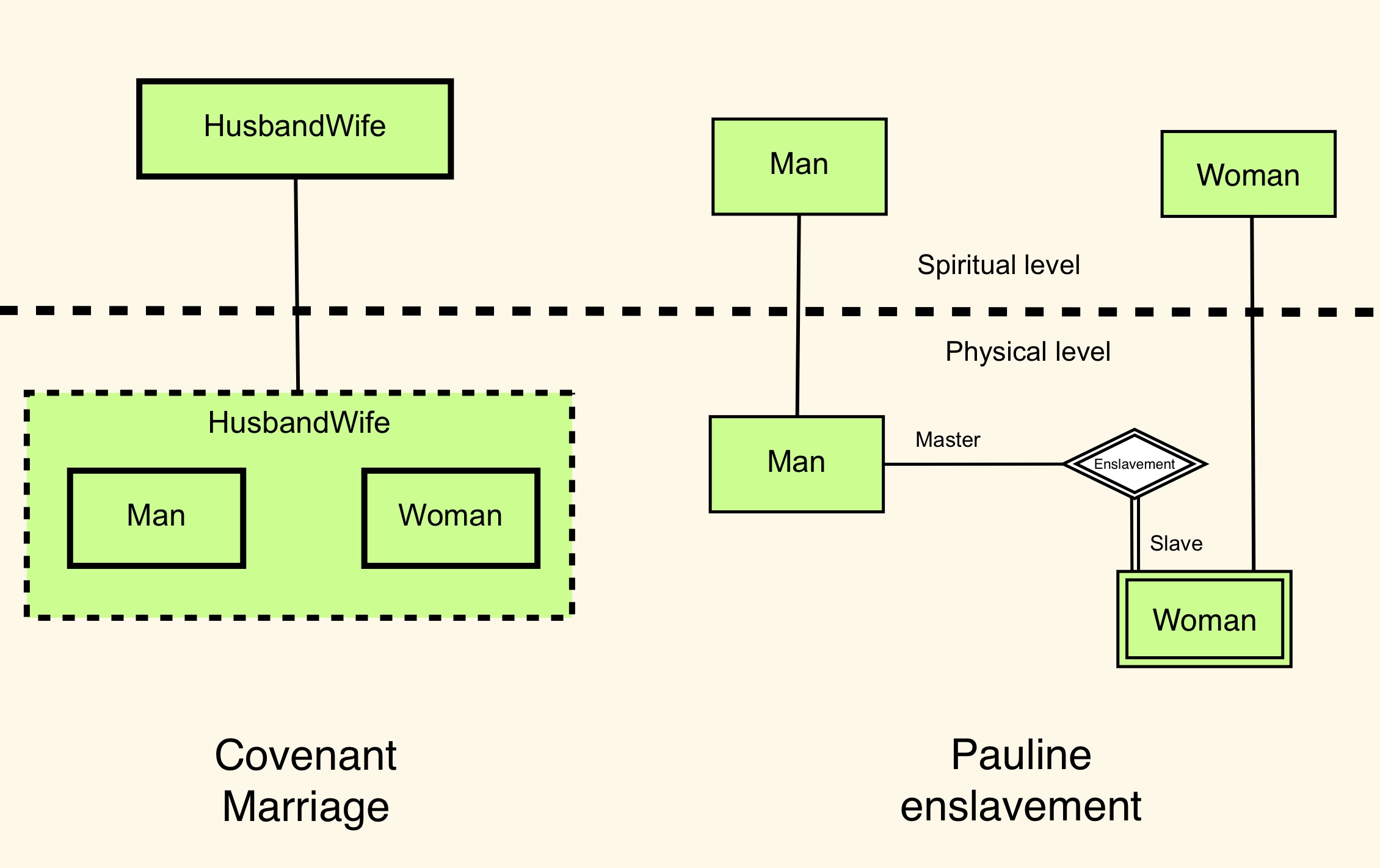
Marriage - a comparison.
Christian marriage is not marriage as the Lord intended it. It is enslavement.
This is a state which feeds off Pauline error. In some respects, Paul's doctrine is no better than civil law:
[2] For the married woman is bound by law to her husband as long as he is alive; but if her husband dies, she is released from the law concerning the husband. (Romans 7:2 NASB)
Yet in other respects, Paul's doctrine is more evil than civil law, since it embodies enslavement:
[11] Let a woman learn in silence with full submission. [12] I permit no woman to teach or to have authority over a man; she is to keep silent. [13] For Adam was formed first, then Eve; [14] and Adam was not deceived, but the woman was deceived and became a transgressor. [15] Yet she will be saved through childbearing, provided they continue in faith and love and holiness, with modesty. (1 Timothy 2:11-15 NRSV)
[34] women should be silent in the churches. For they are not permitted to speak, but should be subordinate, as the law also says. [35] If there is anything they desire to know, let them ask their husbands at home. For it is shameful for a woman to speak in church. (1 Corinthians 14:34-35 NRSV)
With regard to marriage, only Covenant Marriage provides the true unity required by Jesus (John, chapter 17). And because of this true unity, the resulting potentiation will lead to a yield greater than the sum of individual efforts - which makes a mockery of Paul's doctrine:
[32] I want you to be free from anxieties. The unmarried man is anxious about the affairs of the Lord, how to please the Lord; [33] but the married man is anxious about the affairs of the world, how to please his wife, [34] and his interests are divided. And the unmarried woman and the virgin are anxious about the affairs of the Lord, so that they may be holy in body and spirit; but the married woman is anxious about the affairs of the world, how to please her husband. (1 Corinthians 7:32-34 NRSV)
Order of precedence in the church, according to Paul:
But I want you to understand that Christ is the head of every man, and the husband is the head of his wife, and God is the head of Christ. (1 Corinthians 11:3 NRSV)
Paul's enslavement of women shows a level of evil which corrupts even the Twelve. It is secured by duress.
More might be said about Paul's enslavement of women, but we'll leave it there for now.
Peter is seduced by Paul's doctrine. He opens up a real can of worms in his first letter:
[1] Wives, in the same way, accept the authority of your husbands, so that, even if some of them do not obey the word, they may be won over without a word by their wives' conduct, [2] when they see the purity and reverence of your lives. [3] Do not adorn yourselves outwardly by braiding your hair, and by wearing gold ornaments or fine clothing; [4] rather, let your adornment be the inner self with the lasting beauty of a gentle and quiet spirit, which is very precious in God's sight. [5] It was in this way long ago that the holy women who hoped in God used to adorn themselves by accepting the authority of their husbands. [6] Thus Sarah obeyed Abraham and called him lord. You have become her daughters as long as you do what is good and never let fears alarm you. (1 Peter 3:1-6 NRSV)
Peter resorts to coercion.
[ Critique: 1 Peter 3:1-6.]
Yet what is worse, Peter gives Paul unqualified support, declaring Paul's doctrine to be free of error‡ :
[14] Therefore, beloved, while you are waiting for these things, strive to be found by him at peace, without spot or blemish; [15] and regard the patience of our Lord as salvation. So also our beloved brother Paul wrote to you according to the wisdom given him, [16] speaking of this as he does in all his letters. There are some things in them hard to understand, which the ignorant and unstable twist to their own destruction, as they do the other scriptures. (2 Peter 3:14-16 NRSV)
[Essay: The effect of duress or coercion on a contract.]
[‡ Here may be found the reasons for removing all the letters from the Bible. The Scriptures have no place for that which is corrupt.]
The false unity of modern marriage is revealed by Jesus' words:
[34] I tell you, on that night two people will be in one bed; one will be taken and the other left. (Luke 17:34 NIV)
Paul wrongly states that an unbelieving spouse is sanctified (GNT 'made acceptable') by the believing spouse:
[14] For the unbelieving husband is made holy through his wife, and the unbelieving wife is made holy through her husband. Otherwise, your children would be unclean, but as it is, they are holy. (1 Corinthians 7:14 NRSV)
Or, as the GNT renders the text:
[14] For the unbelieving husband is made acceptable to God by being united to his wife, and the unbelieving wife is made acceptable to God by being united to her Christian husband. If this were not so, their children would be like pagan children; but as it is, they are acceptable to God. (1 Corinthians 7:14 GNT)
[Analysis: 1 Corinthians 7:14.]
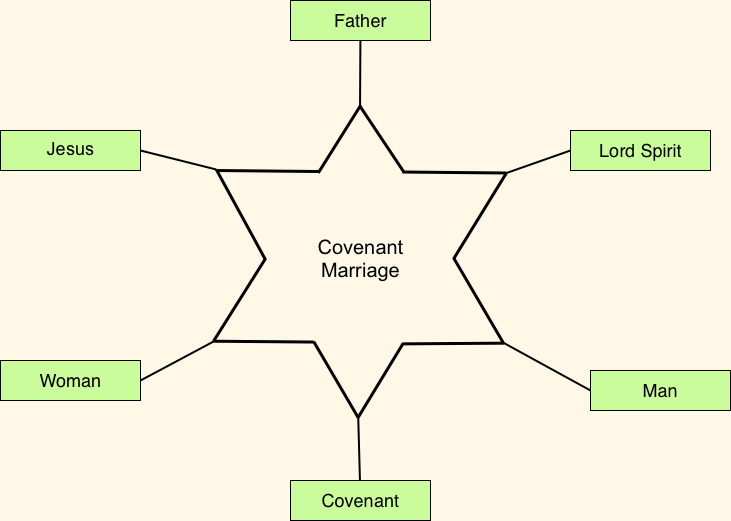
Covenant Marriage.
Covenant Marriage is shown here as a sixth-order n-ary relationship. Normally I'd use a diamond to indicate a relationship; but the option to use the Star of David was too good to pass up!
For the relationship to hold, all six entities have to exist and participate. So, if the Covenant is replaced by the new-covenant, for example, then the relationship is false and therefore doesn't have existential existence.
'Covenant Marriage' will be the only available option within the Order of Melchizedek, since it will avoid human appointment and the 'laying on of hands', and will ensure the integrity of the line of descent. The position of Priest in the Order of Melchizedek is through direct descent; but because the Order operates at a level far above the Levitical Priesthood, it is subject to more binding terms and conditions of service. Recall that priests in the Order of Melchizedek are priests after God's own heart (qv).
With the signing of the Marriage Contract, the state changes to that of Covenant Marriage.

This is the marriage which transcends death.
If either husband or wife dies, the surviving party must continue the relationship at the Spiritual Level ... until they are reunited in the Heavenly Realm. The Lord Spirit has been likened to Fire (eg Zech. 2:5 and Acts 2:3), and this applies to Covenant Marriage since the Lord Spirit is a party to the Covenant Marriage Contract.
This secular song by Chris de Burgh reflects the desire, need, and aspiration of some:
Yet it is really only possible within the framework of Covenant Marriage - marriage which transcends death. The living and the departed remain bound by Fire at the Spiritual Level, so the survivor must continue as HusbandWife, collaborating with the departed spouse and the Lord at the Spiritual Level. However, if the survivor extinguishes the Fire for any reason, then HusbandWife will no longer remain an entity, and the marriage will collapse.

Paul, unsurprisingly, gets things so wrong:
[32] But I want you to be free from concern. One who is unmarried is concerned about the things of the Lord, how he may please the Lord; [33] but one who is married is concerned about the things of the world, how he may please his wife, [34] and his interests are divided. The woman who is unmarried, and the virgin, is concerned about the things of the Lord, that she may be holy both in body and spirit; but one who is married is concerned about the things of the world, how she may please her husband. (1 Corinthians 7:32-34 NASB)
Why is Paul wrong? The priests in the Order of Melchizedek are part of a hereditary structure, the Two Olive Trees - or their specialisations, the Cypress and the Myrtle. Their office requires that the husband and the wife are God's appointees. This is nothing less than a marriage arranged by no less a person than the Most High!
The Lord wants His people in every walk of life. Even if such office is not for us, the Covenant married state remains something to which we may aspire, a state we desire to embrace, and a state we commit to. Unless prohibited by the Lord, there is nothing stopping an engaged couple choosing Covenant Marriage over civil marriage.
We can still ask the Lord for His recommendations. This is a decision He may leave to us; or He may offer specific directions. As individuals or groups, despite considerable overlap, each occupies a unique place in society. And the Lord God demands max effectiveness! (See: Guidance.)
Paul's teaching on marriage is as far removed from Covenant Marriage as North is from South. By way of comparison, here is a schematic of Covenant marriage:
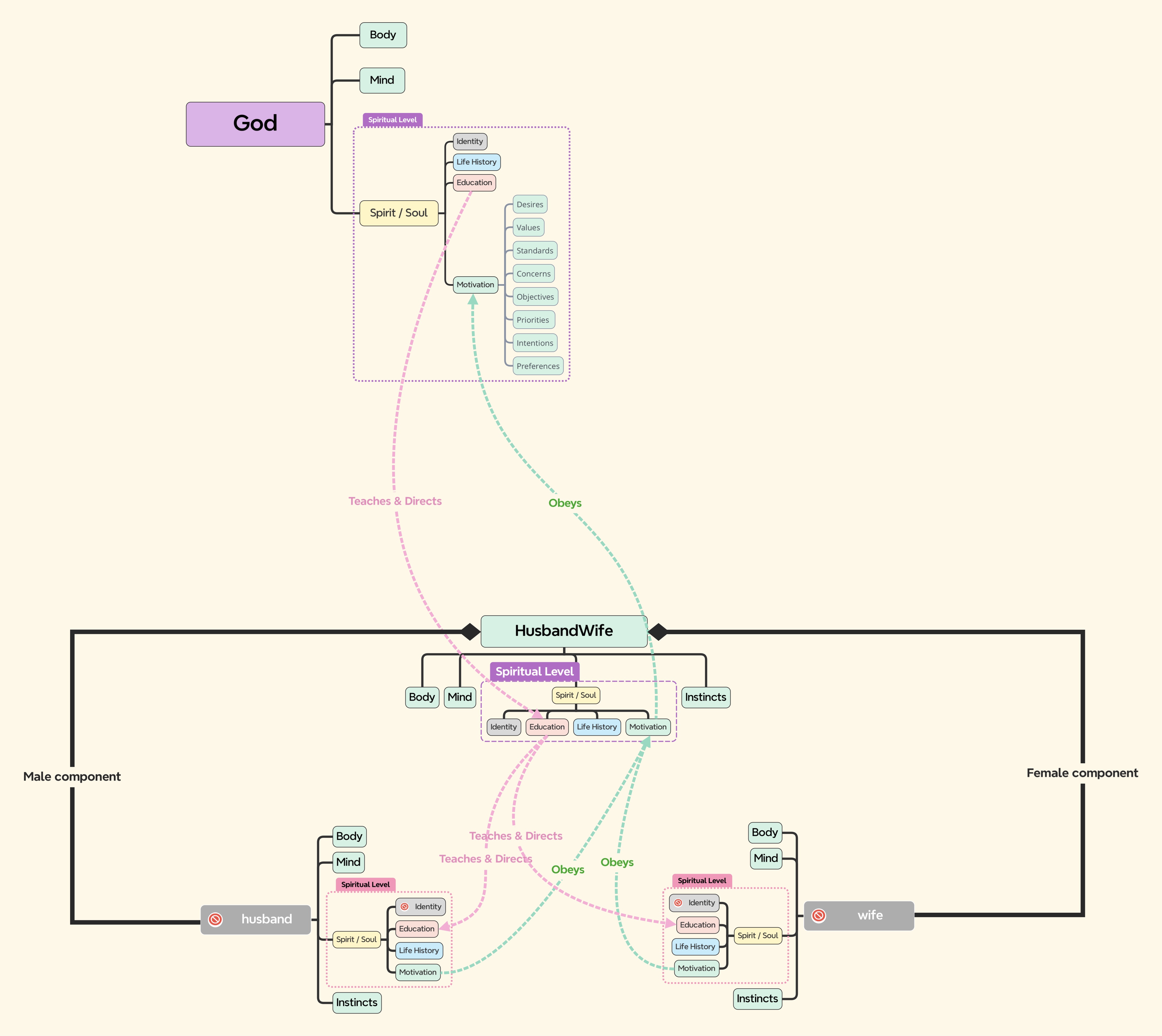
Married state - Covenant.
Note that although the schematic shows direct access to the Father, access may be indirect through Jesus or the Lord Spirit (see 'Trinity dependencies' above).
The schematic of the married state shows the unity which exists between husband and wife. Not only are they one person at the physical and spiritual levels, but they see themselves as such. They see themselves as components in a compound, complex entity, namely HusbandWife.
Each brings different things to the table. And these different attrinbutes complement each other within the unity of their relationship. The strengths of one complement the weaknesses of the other.
Where there is genuine unity within marriage, then each has an equal say in the decision-making process. However, one would expect there to be differences in ability and knowledge between husband and wife. One would also expect each to recognise their own areas of weakness and the strengths of the other; in such cases one might choose to defer to the expertise of the other.
I can think of no better example than my parents. My Dad was perhaps the best organiser and administrator I've come across; Mother, though not so good at organising, had a very good head for managing the household finances at a time of low income. Although each was ready to defer to the expertise of the other, they nevertheless talked through the issues together as equals and came to a joint decision. How much better is that than Paul's 'doctrine' of the man knowing everything:
[34] women should be silent in the churches. For they are not permitted to speak, but should be subordinate, as the law also says. [35] If there is anything they desire to know, let them ask their husbands at home. For it is shameful for a woman to speak in church. (1 Corinthians 14:34-35 NRSV)
Paul's doctrine regarding marriage and women in general (qv), raises men to the level of tin gods. Paul indirectly parallels the Serpent's words to Eve:
[4] But the serpent said to the woman, "You will not die; [5] for God knows that when you eat of it your eyes will be opened, and you will be like God, knowing good and evil." (Genesis 3:4-5 NRSV)
As the schematic shows, husband and wife are a single entity. Their commitment to a Covenant Marriage finds them being taught and directed by the Lord, and obeying the Lord's instructions and directions.
As HusbandWife obey the Lord's directions, they will carry out His wishes for their lives and for outreach in a world hell-bent on self-destruction.
The unity which exists within the marriage results in potentiation, in which the output of the 'one' is greater than the sum of each individual component taken separately. This is undouptedly why the Lord chose sexual reproduction within the context of Covenant Marriage: not only does it lead to a division of labour within the family context; but it is also offers potentiation and greater productivity to those who understand and practise the topic.
However, since HusbandWife are taught by the Lord and are obedient to his directions, there is an additional layer of unity with the Trinity, which results in an additional level of potentiation.
Here, then, is found the true unity demanded by Jesus. And this unity will result in potentiation and a serious increase in yield:
[20] "I ask not only on behalf of these, but also on behalf of those who will believe in me through their word, [21] that they may all be one. As you, Father, are in me and I am in you, may they also be in us, so that the world may believe that you have sent me. [22] The glory that you have given me I have given them, so that they may be one, as we are one, [23] I in them and you in me, that they may become completely one, so that the world may know that you have sent me and have loved them even as you have loved me. [24] Father, I desire that those also, whom you have given me, may be with me where I am, to see my glory, which you have given me because you loved me before the foundation of the world. (John 17:20-24 NRSV)
See Covenant Safeguards.
When a man and a woman agree to marry, they must first deal with any vows to which they are individually committed. Some vows may no longer be relevant; while others may no longer be appropriate. Needless to say, resolution will require discussion between all participating parties:

Covenant Marriage - Participants.
Discussion will inevitably spill over into their accountability and their terms of service...
[Essay: Personal face-to-face discussion with the Lord is a 'sine qua non' element of the Covenant.]
Version: 2024-09-02